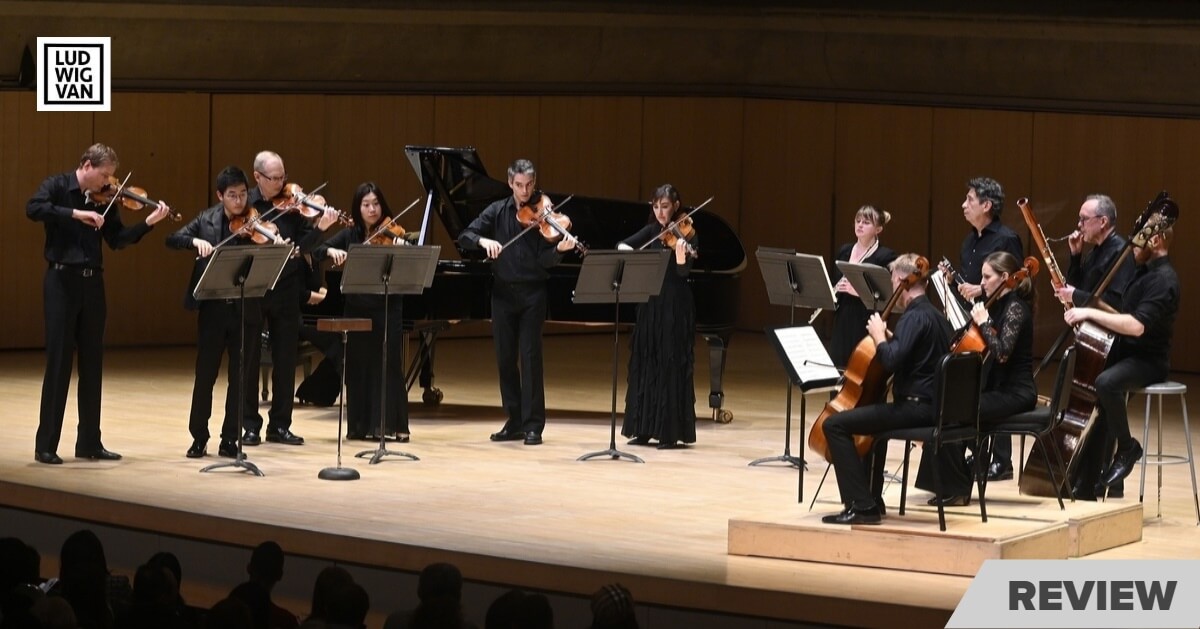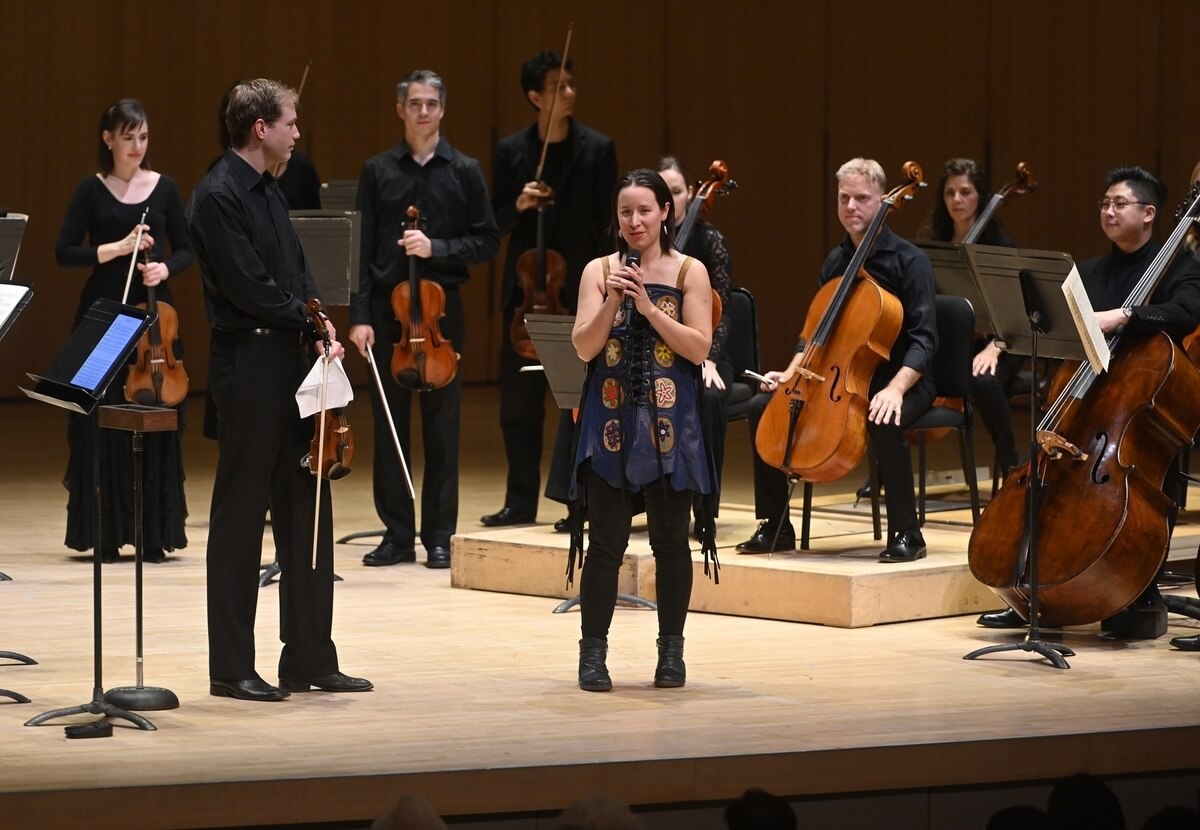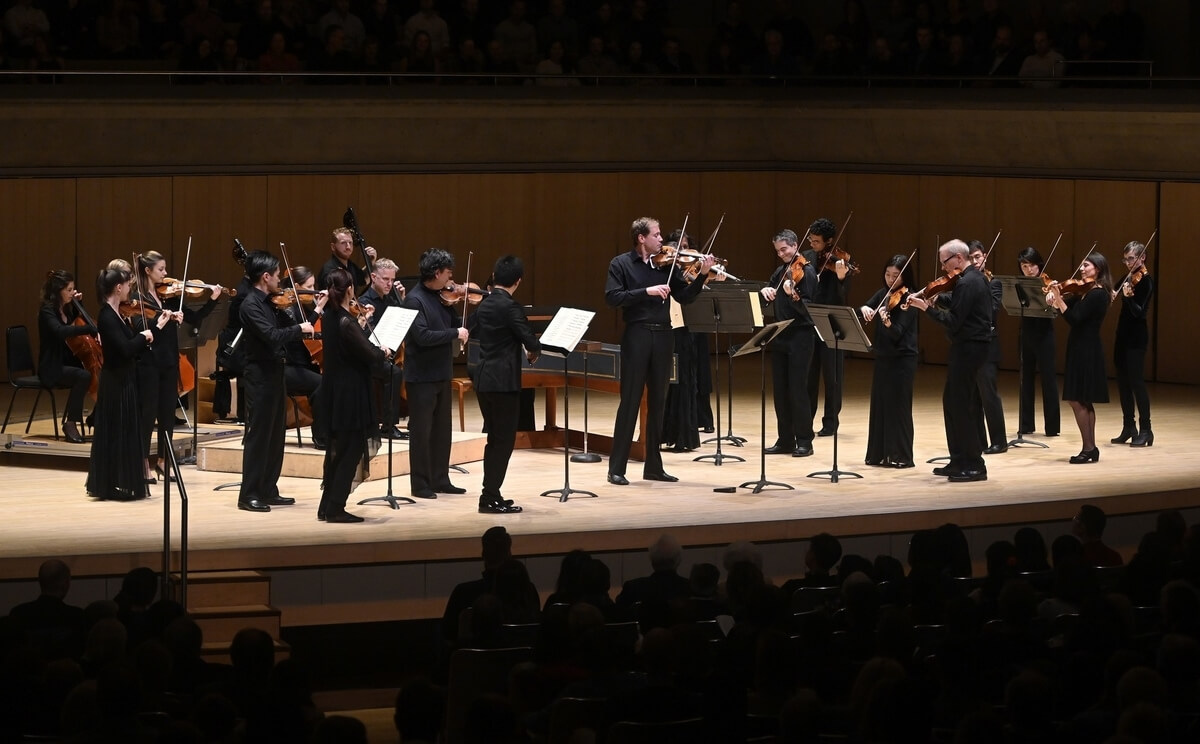Jonathan Crow and the TSO charmed the audience with refined interpretations of Braden, Copland and Vivaldi’s beloved Four Seasons.

Carmen Braden: Songs of the Invisible Summer Stars; Copland: Suite from Appalachian Spring (1944 original orchestration); Vivaldi: The Four Seasons. Jonathan Crow leader & violin; Toronto Symphony Orchestra. George Weston Recital Hall at North York Meridian Arts Centre, 3 p.m. November 17, 2019
For an orchestra to survive in these difficult economic times, good directors knows to play not just for their base audience and at their main venue, but also to extend its organization’s reach into the community and beyond. That often involves specialized concerts, adapted for different audiences and differing acoustic spaces.
The George Weston Recital Hall at North York’s Meridian Arts Centre has been a favoured destination for the TSO for some years now, in large part for being able to take more popular and accessible programs to concertgoers who otherwise would be less inclined to travel downtown to Roy Thomson Hall. But concerts at the George Weston also provide opportunities to program smaller works in a smaller acoustic, works which confer a friendly ambience and a feeling of interacting more closely with the performers.
All these virtues were on display at Sunday afternoon’s concert, led ably by concertmaster Jonathon Crow. I was unable to attend Saturday night’s opening of the TSO’s chamber performance recital, so I took the opportunity to take in one of these Sunday afternoon alternate-venue recitals consisting of Vivaldi’s Four Seasons and Copland’s Appalachian Spring.
A pleasant addition which led off the afternoon was Carmen Braden’s five-movement program work Songs of the Invisible Summer Stars, performed here in its chamber orchestra version. Depicting coolly starless twilight in the Canadian north set through slow-fast-slow-fast-slow evocations of invisible stars’ voyages during long Arctic summers was certainly an original conceit, albeit of musically familiar, tonal proportions.

For Braden, it seemed the stars were ethereal and distant, aloof to our wonderings but still fancifully depictable through our atmospheric lens on Earth. “A clandestine meeting with an Aurora” was a particularly fine moment, replete with horn solo evoking the wind as you only hear it in the Arctic and some rasping ponticello on strings, with judiciously well-places harmonics.
The odd-numbered slow pieces were my favourite, subsuming isolation, quietude, reflection and a pervasive, dreamy melancholy I associate with being Canadian into a vast but welcoming landscape where it is possible to encounter scarcely another person in a day, if one wishes. I relished the work’s imaginative concept and its environmental theme. Many of us can intuit space for more pieces like these from Braden in the future, and with considerably greater harmonic possibilities and adventurous forms.
I was unprepared for what followed when listening to the original chamber version of Copland’s Appalachian Spring. The work exists in so many formats — film, dance, arrangements, thirteen-instruments chamber score, full orchestra, and I have heard so many of these live and on recording that I have learned to take it for granted that the piece works no matter what you do to it.
But, to go back to the version for thirteen instruments is always exciting because it is this incarnation that exposes the work’s enchanting lines and transparent counterpoint most clearly. One must have a strong ensemble to perform it without error, sloppiness, or worst of all what I have frequently encountered are extended sections of interpretive apathy.

But the Sunday afternoon performance not only avoided all these entrapments, it went beyond the merely good. The ensemble was utterly golden throughout, refined, nuanced, stylistically faithful, and always youthful and energetic, just what Martha Graham demanded of Copland when she submitted a rough-draft scenario for him to musicalize.
The hardest part about these pieces is that when one listens to them for a very long time, they acquire a certain sentimentality to them that tempts the listener to tune out what the musicians are actually doing in favour of zeroing in on any given popular work’s ready-made tunefulness.
But the TSO’s ensemble did none of that. Each solo, every line, every colour radiated a newness to the work such that you were gently coerced to follow whatever story you thought the music was telling you, so compelling was this narrative.
I was overwhelmed at the music’s intended frankness, brought to life uncannily well. Perhaps this demonstrates how easily Copland’s film and dance music are taken for granted. We often lose sight of how good his more tuneful works really are, branding their accessibility as mere pop. But pieces such as Quiet City and Our Town are humbling in their forthright ability to reach us with a kind of directness for which, if we are to be emotionally honest with ourselves, we can be emotionally unprepared.
One cannot say the same for the concert’s second half, Vivaldi’s Four Seasons, led by violin soloist Jonathan Crow. These immensely successful, crowd-pleasing performances of Vivaldi’s most famous four concerti had everything going for them, including muscular solo work, clearly delineated basso continuo, some acutely lovely effects (the ticking grandfather clock in the slow movement of “Winter”) and an amiable ensemble Venetian atmosphere that reached well off the stage and completely charmed the audience.

Readings of the appended sonnets in four languages (English, Japanese, Mandarin, French) were luscious and sonically beautiful — foretastes of poetic musicalizations which followed. They underscored the collective point of the concerti as program pieces intended to paint Italy’s extremes of seasonal, and often unpredictable, weather along the Mediterranean.
Most striking however, given the context and city where these concertos were performed, was the older, more traditional sound world the ensemble elected to recreate for us yesterday afternoon. Toronto is an early music capital in North America and, along with Montreal and Quebec City, we have saturated the landscape with performance practice Baroque interpretation for four decades. Therefore, it was unusually nostalgic to hear the 25 or so string players sounding like an old I Musici recording in almost every way.
But that was the performance’s intended charm, as it turned out. Crow performed as well as, and often even better than, the great Italian violinist on those recordings, Salvatore Accardo (who, just as an aside, is also the world’s greatest living Paganini interpreter). But the aesthetic didn’t sound exactly old-fashioned either. Crow and Co. made a strong case for this lush style of playing which favours the earthy warmth of the modern violin, intermixed with some authentic period bowing, without sacrificing the value of hearing Vivaldi with our modern ears. It was a conspicuously successful approach that was engaging and musically important at the same time.
It all added up to savvy performing in an acoustic space that was very nearly sold out. The marketing and programming were smart yet simple, and we need that from time to time as relief from a world filled with often unnecessarily daunting complexity. And for that we are continually grateful to Jonathon Crow and members of the TSO for these concerts and more like them to come.
#LUDWIGVAN
Want more updates on classical music and opera news and reviews? Follow us on Facebook, Instagram or Twitter for all the latest.
- SCRUTINY | Opera Atelier’s Film Of Handel’s ‘The Resurrection’ A Stylish And Dramatic Triumph - May 28, 2021
- HOT TAKE | James Ehnes And Stewart Goodyear Set The Virtual Standard For Beethoven 250 - December 15, 2020
- SCRUTINY | Against the Grain’s ‘Messiah/Complex’ Finds A Radical Strength - December 14, 2020



